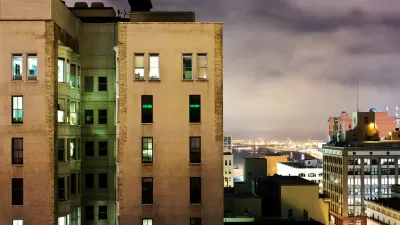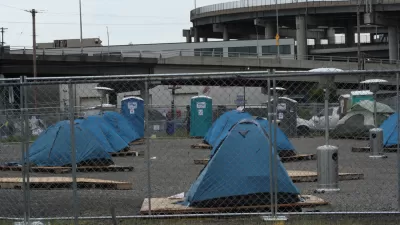Single-room-occupancy hotels are providing much-needed affordable housing for the city’s most vulnerable residents.

Molly Harbarger and Elliot Njus report that single-room-occupancy buildings, once common in Portland, Oregon, are being used to help homeless people as they transition into permanent housing. "The city and county are staking more than $20 million on four projects they hope will both provide a home for the poorest in the city and fulfill a pledge to create housing bundled with social services for people suffering from addiction or other medical problems."
Some homeless advocates are critical of the SROs and argue that people need more privacy and space. But residents say that a roof over their heads and the sense of community and safety are crucial as they face a host of other issues.
SROs are less costly to build and are more affordable for people with limited incomes, but offering additional services along with housing can drive up the price. Still, SRO advocates say the more holistic approach to addressing homelessness can help balance out these costs.
"By hosting medical services, addiction treatment, case managers and other support services on site, officials hope to keep residents off the street for the long term. It also saves the public costs otherwise absorbed through the courts, jails and hospitals," note Harbarger and Njus.
FULL STORY: Portland banking on low-rent SRO hotels to ease housing problems

Planetizen Federal Action Tracker
A weekly monitor of how Trump’s orders and actions are impacting planners and planning in America.

Maui's Vacation Rental Debate Turns Ugly
Verbal attacks, misinformation campaigns and fistfights plague a high-stakes debate to convert thousands of vacation rentals into long-term housing.

Restaurant Patios Were a Pandemic Win — Why Were They so Hard to Keep?
Social distancing requirements and changes in travel patterns prompted cities to pilot new uses for street and sidewalk space. Then it got complicated.

In California Battle of Housing vs. Environment, Housing Just Won
A new state law significantly limits the power of CEQA, an environmental review law that served as a powerful tool for blocking new development.

Boulder Eliminates Parking Minimums Citywide
Officials estimate the cost of building a single underground parking space at up to $100,000.

Orange County, Florida Adopts Largest US “Sprawl Repair” Code
The ‘Orange Code’ seeks to rectify decades of sprawl-inducing, car-oriented development.
Urban Design for Planners 1: Software Tools
This six-course series explores essential urban design concepts using open source software and equips planners with the tools they need to participate fully in the urban design process.
Planning for Universal Design
Learn the tools for implementing Universal Design in planning regulations.
Heyer Gruel & Associates PA
JM Goldson LLC
Custer County Colorado
City of Camden Redevelopment Agency
City of Astoria
Transportation Research & Education Center (TREC) at Portland State University
Jefferson Parish Government
Camden Redevelopment Agency
City of Claremont





























